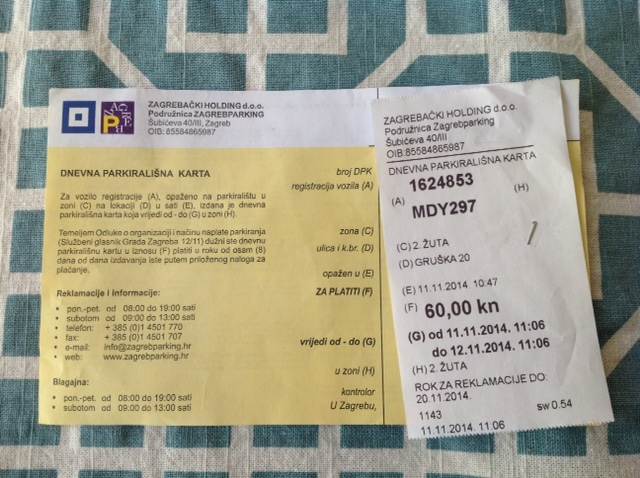It’s really easy to run afoul of parking regulations in Europe. This is especially true in Zagreb, where signage for paid parking isn’t always clear and parking meters can be a block or more away from where you actually parked. So, I was annoyed but not particularly surprised to see a parking ticket sitting on my windshield after parking outside a friend’s apartment overnight.
Zagreb, however, is unusually fair about how parking tickets work. Basically they bill you the full charge for parking in the space for a 24-hour day, starting from the time that the ticket is issued. Parking is split up into zones identified by color. This parking ticket was for a yellow zone, for which the 24-hour charge was about $10. Displaying the ticket on my dashboard entitled me to park in any other yellow zone space in the city until the expiration date. So, this actually didn’t end up costing me any more than just paying normally for parking would have, because I needed to park overnight in the same space again anyway. However, it’s painfully expensive if you didn’t plan to park all day.
The main problem was figuring out how to actually pay for the ticket. The information in English on the back of the ticket isn’t very helpful; it just says that you have to pay within 6 days or it’ll go to collections. And my Croatian employees don’t drive, so they had no idea how to deal with the problem. However, one of my Croatian friends does drive, and told me that I could just pay the ticket at, among a long list of other places, the post office.
My Croatian friend tried to convince me very hard not to pay the parking ticket. “Your car is from Budapest? They’ll never track you down,” he said. I wasn’t so sure, and didn’t want to risk not paying the parking ticket. I really don’t recommend that you risk avoiding traffic fines in Europe either. Generally speaking, the parking authorities will just send the fine–with hefty late payment charges tacked on–to your car rental company. They will pay the ticket on your behalf, tack on their own fines and handling fees, and bill your credit card “for your convenience.” There is no disputing or getting out of any of these charges, because you explicitly agree to them in the rental contract and generally initial a separate provision acknowledging that you understand this. Actually, I have personal experience with this. I was tracked all the way across the Pacific Ocean from Australia a year later after receiving a parking ticket in error, and had to argue the fine vehemently with Sydney parking authorities before it was finally rescinded (in this case, I had genuinely been ticketed in error and could provide proof that I was authorized to park in the space).
Fortunately the Croatian post office is pretty good and they have locations all over the city, including one within easy walking distance of my friend’s apartment. They are friendly, efficient and speak English. 65 kuna and 5 minutes later (including the fee for making the payment), and I was on my way with a payment receipt.
If you ever get a parking ticket in Zagreb, I hope this is useful! It’s best not to get one in the first place, though. Always double check whether you’re in a paid parking space. Very few spaces on the street are free, and you might have to hunt around for a parking meter to pay. They don’t take credit cards, and generally only take Croatian coins, so be sure that you carry plenty of change in the car. And, of course, don’t drive if you can avoid it. The hassle and expense are rarely worth it.



